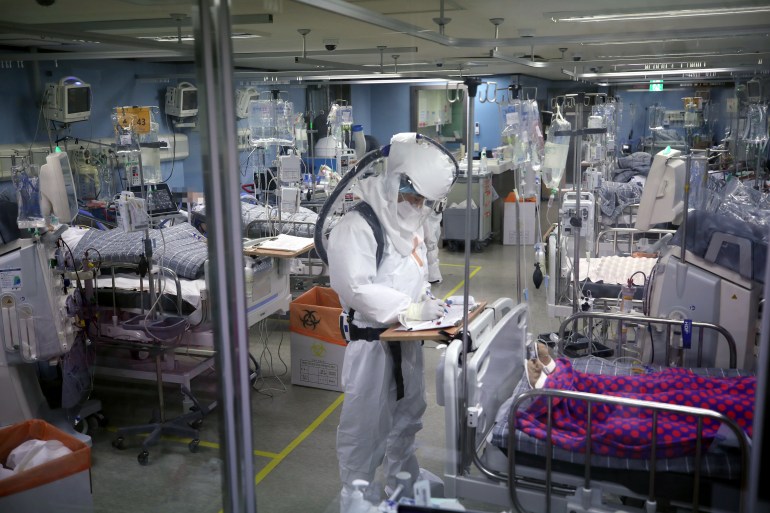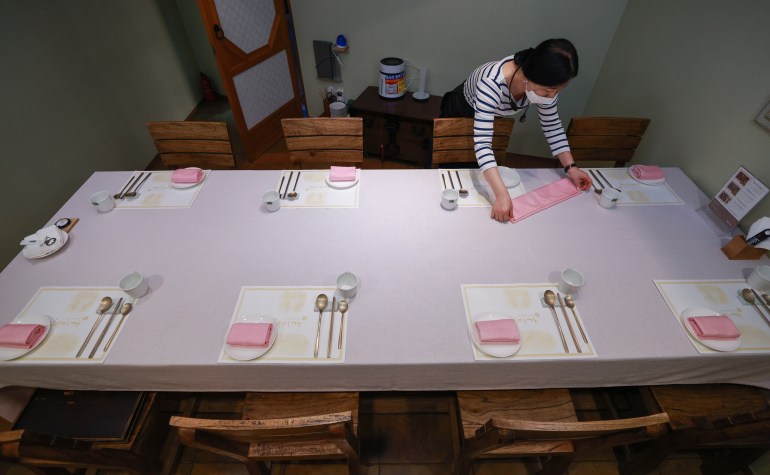Seoul, South Korea – Imagine two people.
Both live in South Korea. Both got their COVID-19 vaccinations in July when they were abroad – one in the US and the other in France.
Both were forced to quarantine on their return to Korea, but the authorities accepted the “fully vaccinated” status of only one of them, which meant that while that person was allowed to go to high-risk places like clubs and bars and avoid future quarantines others found their daily life severely restricted.
One is a South Korean citizen and the other is a foreigner.
“It feels like it’s unfair and, in some ways, discriminatory,” said Laurane Batany, a French national who recently arrived in Korea and was vaccinated in her home country in July.
And your Korean counterpart agrees.
“I cannot find or understand any reasonable reason to treat foreign residents differently than Koreans for the exact same certificate. It’s like they think foreigners are more likely to lie. It’s a shame and outright discrimination, ”said Choi Il-woo, a Korean national who was vaccinated in the US in July.
Vaccine approval is crucial in a South Korea that this month revised pandemic restrictions under a “Living with COVID-19” policy.
The new rules include a COVID-19 pass that allows fully vaccinated access to facilities such as nightclubs, bars, gyms and sports venues. This is the passport – an app called COOV – that excludes foreigners vaccinated outside of Korea.
The COOV app is critical to access to sports venues, gyms, and other “high risk” locations [Ahn Young-joon/AP Photo]
Korean officials have raised concerns about the credibility of vaccination outside its borders and are demanding that foreigners go to the Korean consulate in the country where they were vaccinated for a “quarantine release” before entering South Korea. This exception means that your vaccine can be registered in the COOV app.
“Since it is difficult to verify the authenticity of a vaccination card issued from abroad, a vaccination card issued from abroad will only be recognized by the Korean government if, in the case of a foreign citizen, a quarantine exemption is presented by the diplomatic offices of Korea abroad,” read a statement by the Korea Disease Control and Prevention Agency that was passed on to international journalists.
South Korea also has a list of 16 countries, including Myanmar, South Africa and Chile, from which a quarantine exemption is not even possible.
Confusing and complicated
As the world slowly opens up again and international travel shows signs of recovery, countries have their own and sometimes conflicting guidelines, although WHO advises governments to avoid exclusive guidelines and to recognize vaccines equally across borders.
Some other countries have also placed restrictions on the vaccines they will accept, with some not recognizing those vaccinated with the Chinese Sinovac and Sinopharm vaccines or the Russian Sputnik-V vaccine.
“Some of the COVID-19 guidelines in South Korea right now are literally as insane as the one in North Korea,” said Chad O’Carroll, journalist and founder of North Korea-focused media organization NKnews.org, posted on Twitter.
To make matters worse, some foreigners in South Korea are not even eligible for the exemption. Among them are students.
“Well, because I’m here as a student and students have to go through quarantine when they arrive, I couldn’t get a quarantine exemption,” Batany told Al Jazeera.
Students “are simply NOT eligible to apply for a quarantine exemption,” as the Korean embassy in Finland writes in bright red letters on its website.
Unable to register in the Korean system and download the COOV app to prove her double-stabbed status, Batany has been banned from certain parts of Korean society.
“I tried to enter some kind of dance hall and bar and the person at the entrance told us that we could not enter with our foreigner vaccination certificate, we had to get the COOV app. We couldn’t have our vaccinations recognized, ”she said.
 South Korea is grappling with a spate of cases as it moves towards “living” with the coronavirus [Yonhap via EPA]
South Korea is grappling with a spate of cases as it moves towards “living” with the coronavirus [Yonhap via EPA]
The fact that the rules only apply to foreigners living in South Korea, not citizens, has upset many.
In a press conference last week, health officials did their best to explain that the restrictions were practical rather than xenophobic.
“It’s difficult to go through the verification process, some countries have standardized formats for verification while other countries accept different types of evidence from clinics, hospitals or local governments,” said Son Youngrea, a health ministry spokesman. “That is why we ask for declarations of waiver, which will be issued by our foreign offices.”
However, not everyone agrees.
Foreigners weeded out
The British ambassador has criticized the logic of the Korean system.
“If proof of a foreign vaccination by a Korean national is sufficient to register that vaccination for the vaccination record, the same proof should also be sufficient to register the foreign vaccinations of foreign nationals,” said Simon Smith, British ambassador to South Korea, said in a video uploaded to his embassy’s official Twitter account.
The vaccination record policy has rekindled concerns about official discrimination against foreigners in a country where only about three percent of the population are non-Korean.
Earlier this month it was revealed that the small town of Gimhae ordered that all foreign children must be tested for the coronavirus after a surge in kindergarten-related cases. The online backlash caused the city to withdraw the order and apologize.
“We are sorry that we caused inconvenience to the parents of foreign children,” the local government told the South Korean intelligence service Yonhap.
There are currently no laws in South Korea against discrimination based on ethnicity, race or sexual orientation.
Numerous laws have been proposed since 2007, but have made no progress due to opposition from conservative politicians and religious groups.
“This law is a very common and fundamental law, it is an equality law that is enshrined in the Korean Constitution,” said Lee Jong-geol, co-head of the South Korean Anti-Discrimination Law Coalition. “[The vaccination controversy] will help Koreans get more interested and understand why they need anti-discrimination law. “
 South Korea has eased restrictions on people fully vaccinated, but people need to use an app to view their status and check-in at places like restaurants and bars [File: Yonhap via EPA]
South Korea has eased restrictions on people fully vaccinated, but people need to use an app to view their status and check-in at places like restaurants and bars [File: Yonhap via EPA]
As the British Ambassador noted, discrimination against foreigners due to COVID-19 vaccinations affects not only companies and investors, but also people who actively contribute to Korean society.
But for Betany and other foreigners resident in South Korea who have been vaccinated elsewhere, any change in the law may be too late.
For now, they have to follow the rules for those who have had no vaccination at all – submit a negative PCR test done within the last 48 hours to get to a gym, club, or other large venue.
Some will be vaccinated again, but Betany just hopes for the best and that the government will change its policy.
“I think we have to wait,” she says with a laugh.
https://www.aljazeera.com/news/2021/11/26/south-korea-4












/cloudfront-us-east-2.images.arcpublishing.com/reuters/JEUL2B5V7BJCFMRTKGOS3ZSN4Y.jpg)



/cloudfront-us-east-2.images.arcpublishing.com/reuters/DYF5BFEE4JNPJLNCVUO65UKU6U.jpg)

/cloudfront-us-east-2.images.arcpublishing.com/reuters/UF7R3GWJGNMQBMFSDN7PJNRJ5Y.jpg)












